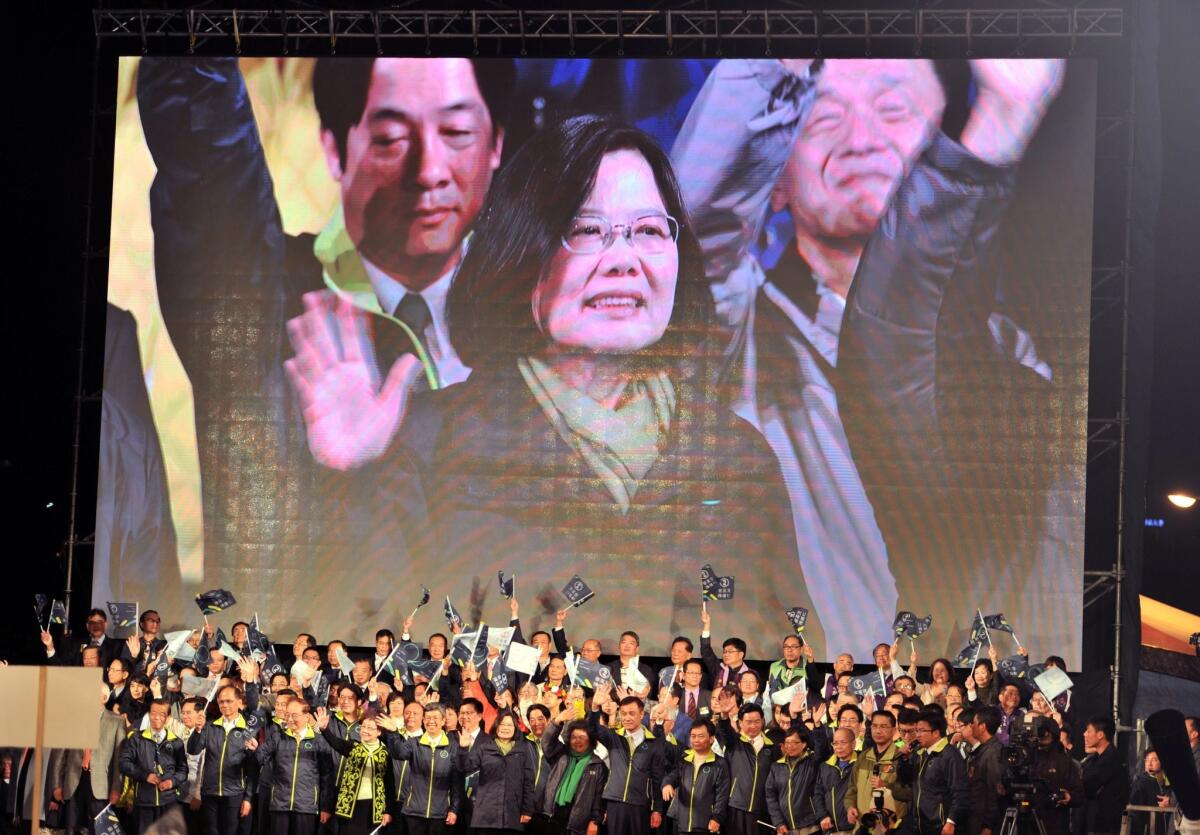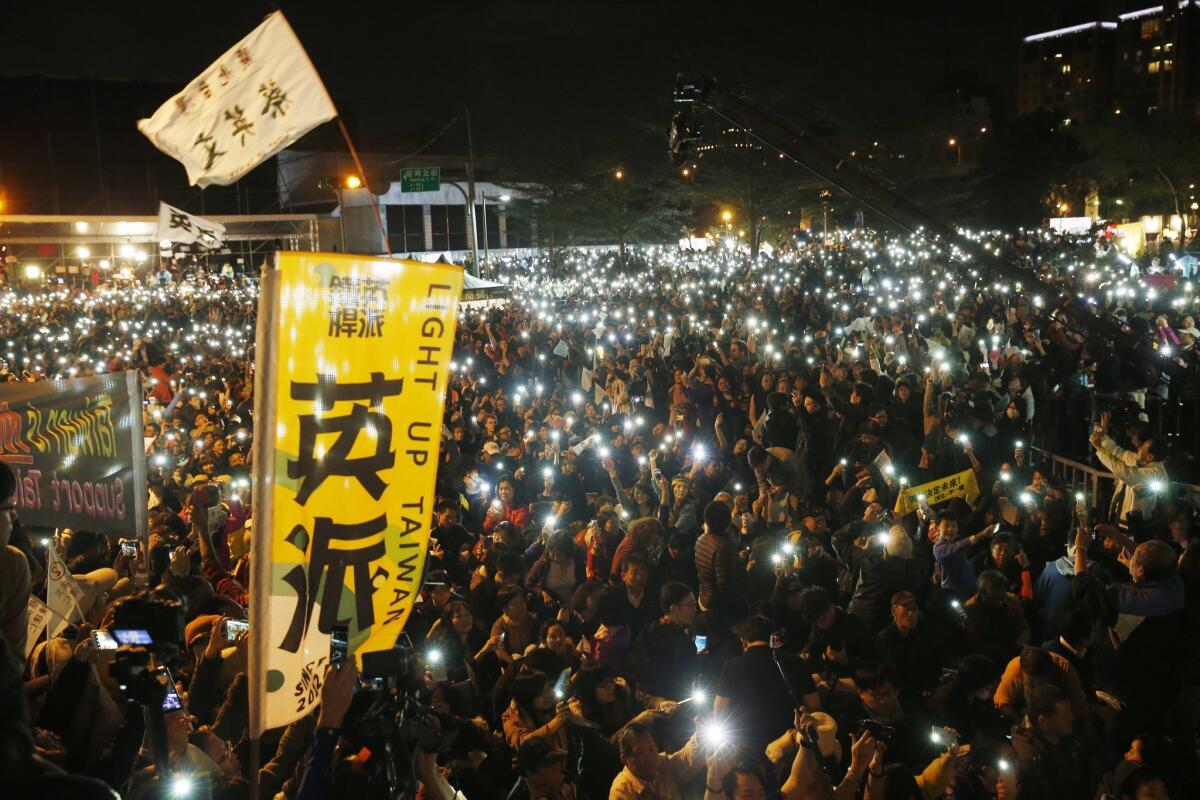Here’s why Taiwan and mainland China will probably find a way to get along

Taiwan President-elect Tsai Ing-wen appears on a screen as she celebrates her victory alongside party officials in Taipei, Taiwan.
- Share via
Reporting from Taipei, Taiwan — The large black banner that supporters of Taiwan’s Tsai Ing-wen brought to her presidential election victory rally on Saturday evening is just the kind of thing that makes leaders of China’s Communist Party nervous about her Democratic Progressive Party.
“Taiwan is NOT part of China!” read the sign. “Support Taiwan independence.”
Yet even though Tsai’s victory was propelled to a significant extent by voter unhappiness with moves by outgoing President Ma Ying-jeou and his Nationalist Party to forge economic and tourism links with mainland China, observers believe authorities on both sides of the Taiwan Strait are likely to proceed cautiously in the months ahead and try every politically feasible way to work things out.
One of the immediate objectives for Tsai will be finding ways to boost growth on the self-ruled island of 23 million; scaling back or cutting the ties established by Ma’s administration would hardly help Taiwan’s struggling, export-dependent economy. China is Taiwan’s biggest trading partner by far. Trade reached $130 billion in 2014, and nearly four million tourists came from the mainland, up from a trickle before 2008.
And for Beijing, suddenly putting relations in a deep freeze could also have economic downsides, and erode any goodwill President Xi Jinping built up with his decision to meet Ma face to face in Singapore in November — the first such meeting between leaders of the two sides since 1949.
This year’s election “definitely is a rebuttal against the Ma administration’s policies against China and Ma’s current hypothesis on relations with China,” said Lai I-chung, vice president of Taiwan Thinktank and the Democratic Progressive Party’s former China policy head. “But I don’t think it means the current population wants to have a war with China. I think the Democratic Progressive Party in their minds wants to have a stable and peaceful relationship with China.”
Taiwan has been self-ruled since 1949, when Chiang Kai-shek’s Nationalist government lost China’s civil war to Mao Tse-tung’s Communist forces and retreated to the island 100 miles off the mainland’s southeast coast. For decades after, both governments insisted that they were the rightful representatives of China.
See more of our top stories on Facebook >>
Leaders in Beijing continue to view Taiwan as a province that got away and must be reunified with the mainland someday.
In Taiwan, although the constitution still claims sovereignty over all of China, opinion polls show only about 11% of people support reunifying with the mainland now or at some unspecified time in the future. For the time being, a vast majority say the best option is just to maintain the island’s ambiguous status quo — functioning largely as an independent country, though lacking a seat at the United Nations and formal diplomatic relations with all but 22 countries.
Chen had more of a hot personality and sort of a hot political persona; [Tsai] is cooler.
— Richard C. Bush III, a Taiwan expert at the Brookings Institution in Washington
China often tries to block Taiwan’s attempts to participate in international organizations and events because it believes such activities could be interpreted as signs of Taiwanese sovereignty.
Tsai’s party has held the presidency only once before, from 2000 to 2008, under Chen Shui-bian, a former mayor of Taipei and democratic activist. As president, Chen initially reached out to China but backed off amid criticism from his own party; later, he called for the island to join the United Nations under the name Taiwan, and he wanted to draft a new constitution. Beijing responded with anger, and the United States, a key ally of Taiwan, even rebuked Chen.
“Chen had more of a hot personality and sort of a hot political persona; [Tsai] is cooler,” said Richard C. Bush III, a Taiwan expert at the Brookings Institution in Washington.
NEWSLETTER: Get the day’s top headlines from Times Editor Davan Maharaj >>
Also, he said, Chen had no experience in Taiwan’s central government, whereas Tsai’s “main experience has been as a government official, so she knows her way around the halls of power.”
During Chen’s first term, Tsai worked as head of the Mainland Affairs Council, the island’s top policymaking body on relations with Beijing. Before that, she worked with President Lee Teng-hui on mainland issues as well.
Throughout her campaign, Tsai said she would “build a consistent, predictable and sustainable cross-strait relationship.” In a victory speech Saturday, she said she would “work to maintain the status quo for peace and stability,” though she warned pointedly that “our democratic system, national identity and international space must be respected. Any forms of suppression will harm the stability of cross-strait relations.”
Beijing has complained that Tsai has refused to explicitly endorse the 1992 consensus, which holds that there is one China, but that each side of the strait has its own understanding of what that is. The Nationalists have touted the formulation as the “key to cross-strait peace and prosperity,” but whether Tsai and her party are able to come up with some other locution that allows talks to proceed remains to be seen.
Shelley Rigger, a Taiwan scholar at Davidson College in North Carolina, said the meeting between Xi and Ma in November was in some ways a “gift to Tsai. She’s entering office with cross-strait relations the best they have ever been.”
But with anti-China sentiment running high in Taiwan ahead of the election, Tsai had no incentive to be any more accommodating toward Beijing during the campaign, Rigger added.
Between now and her May inauguration, Tsai may find a way to satisfy Beijing enough to move forward, Rigger predicted, though the responsibility is not hers alone.
“My feeling is the ball is in Beijing’s court as well,” she said. “The Xi-Ma meeting shows [Chinese officials] can be flexible if they want.”
Experts said Beijing could try to needle Tsai — for example, by attempting to poach some of the island’s few remaining formal diplomatic allies.

Supporters of Taiwan’s Democratic Progressive Party presidential candidate, Tsai Ing-wen, gather in Taipei to hear her declare victory in the presidential election.
“Best-case scenario would be Beijing and Taipei don’t break any new ground but at least sustain Ma’s openings,” said Denny Roy, senior fellow at the East-West Center think tank in Honolulu. “Worst-case scenario: Beijing punishes Taiwan for having voted in Tsai by pulling back various economic goodies.”
China’s state-run media reacted to Saturday’s election results with less shrill rhetoric than it directed at Chen and took note of Tsai’s pledges to maintain the status quo.
One worrisome detail for Beijing is that Tsai won the election with 56% of the popular vote; her Nationalist Party opponent got just 31%. In contrast, Chen won election in 2000 with just 39% of the vote in a five-way race, and in 2004 he defeated his Nationalist Party challenger by just 30,000 votes out of 12.9 million ballots. This year, the DPP also won an outright majority in Taiwan’s legislature for the first time in history.
But Chen’s narrower margin pushed him to lean more on Taiwan’s pro-independence voters for his base of support. In contrast, Tsai commands much of the electorate’s vast center and seems in no danger of losing pro-independence voters even if she doesn’t take as hard a line as they might like.
From Beijing’s standpoint, Saturday’s election result will be palatable if it merely reflects temporary anxieties in Taiwan about Ma’s specific policies and style of doing business, said Bush, of Brookings.
But if the vote heralds the long-term decline of the Nationalists and “reflects an enduring manifestation of [Taiwanese] fear of mainland intentions and anxiety about being too dependent on China and fear of being on a slippery slope toward unification and domination, that’s another story.”
“That kind of more fundamental realignment,” Bush said, “could call into question the basic assumptions of Chinese policy.”
Jennings is a special correspondent.
Follow @JulieMakLAT for news from China
ALSO
Text of Taiwan’s first female president’s first remarks
In Canada, followers of pastor held by North Korea keep their faith
Indonesian police arrest 12 after Jakarta attack
More to Read
Sign up for Essential California
The most important California stories and recommendations in your inbox every morning.
You may occasionally receive promotional content from the Los Angeles Times.











